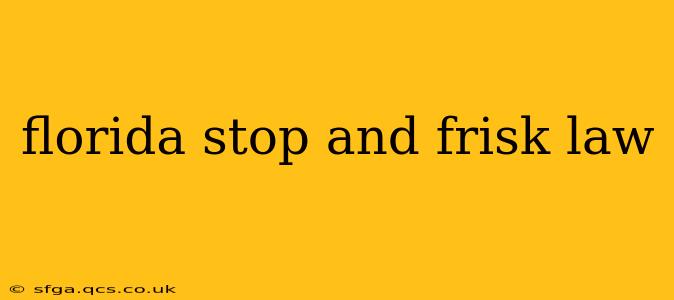Florida, like many states, grapples with the complexities of law enforcement's stop and frisk practices. Understanding the legal framework surrounding these procedures is crucial for both citizens and law enforcement officers. This guide aims to clarify the intricacies of Florida's stop and frisk law, addressing common questions and misconceptions.
What is Stop and Frisk in Florida?
Stop and frisk, also known as Terry stops, refers to the brief detention of an individual by law enforcement based on reasonable suspicion of criminal activity. This reasonable suspicion must be based on articulable facts, meaning the officer must be able to clearly explain the reasons for suspecting criminal activity. Following the stop, the officer may conduct a pat-down (frisk) of the individual's outer clothing to check for weapons if the officer reasonably believes the individual is armed and dangerous. Crucially, the scope of the frisk is limited to a search for weapons; it's not a general search for contraband.
What Constitutes Reasonable Suspicion in Florida?
The threshold for reasonable suspicion is lower than probable cause, which is required for an arrest. Reasonable suspicion requires specific and articulable facts that, taken together with rational inferences from those facts, reasonably warrant the intrusion. This means an officer can't simply stop someone based on a hunch or a general feeling of unease. Factors contributing to reasonable suspicion might include:
- Observed suspicious behavior: e.g., running from the scene of a crime, acting nervously in a high-crime area.
- Information from a reliable informant: The reliability of the informant is a key consideration.
- Matching a description of a suspect: This requires a reasonably specific description provided by a credible source.
- Proximity to a crime scene: Being near a recent crime, without more, is usually insufficient, but it can be a contributing factor.
Can Police Stop and Frisk Someone Based on Race or Ethnicity?
No. The Fourth Amendment of the U.S. Constitution protects against unreasonable searches and seizures. Stopping and frisking someone solely based on their race or ethnicity is considered racial profiling and is unconstitutional. While an officer can consider race as one factor among many in a reasonable suspicion determination, it cannot be the sole basis for the stop. Any stop based primarily on race is likely to be challenged successfully in court.
What Happens if I Believe My Stop and Frisk Was Illegal?
If you believe your Fourth Amendment rights were violated during a stop and frisk, you should document the incident as thoroughly as possible, including the date, time, location, and the officer's name and badge number (if possible). Seek legal counsel to discuss your options. You may be able to file a civil lawsuit against the officer or the police department alleging a violation of your constitutional rights.
What are the Legal Ramifications of an Illegal Stop and Frisk?
Any evidence obtained as a result of an illegal stop and frisk is generally inadmissible in court under the exclusionary rule. This means the evidence cannot be used against you in a criminal prosecution. However, there are exceptions to this rule, such as the "inevitable discovery" doctrine.
What is the Difference Between a Stop and an Arrest?
A stop is a brief detention, while an arrest involves taking someone into custody. A stop is justified by reasonable suspicion, whereas an arrest requires probable cause. The duration of a stop is also limited; prolonged detention without probable cause or reasonable suspicion can constitute an unlawful arrest.
What Rights Do I Have During a Stop and Frisk?
You have the right to remain silent and you don't have to answer any questions. You should politely but firmly assert your rights if you feel the stop is unjustified. You also have the right to ask for the officer's name and badge number. However, it's crucial to remain calm and cooperative to avoid escalating the situation. Remember, resisting arrest or interfering with an officer can lead to further legal consequences.
This information is for educational purposes only and should not be considered legal advice. If you have specific questions about your rights during a stop and frisk or believe your rights have been violated, you should consult with an attorney.
